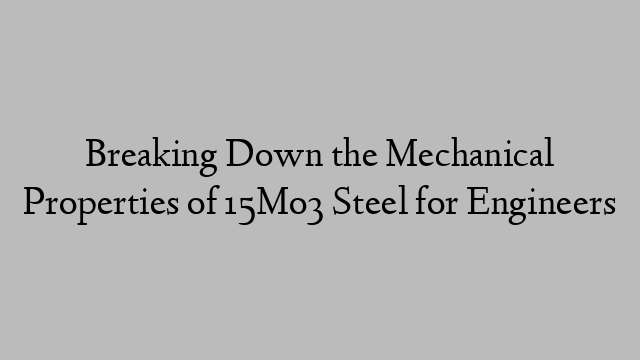Address
304 North Cardinal St.
Dorchester Center, MA 02124
Work Hours
Monday to Friday: 7AM - 7PM
Weekend: 10AM - 5PM
Address
304 North Cardinal St.
Dorchester Center, MA 02124
Work Hours
Monday to Friday: 7AM - 7PM
Weekend: 10AM - 5PM

Breaking Down the Mechanical Properties of 15Mo3 Steel for Engineers
Mechanical properties are an important factor to consider when working with steel in engineering applications. The mechanical properties of 15Mo3 steel, a low-alloy steel commonly used in pressure vessels and boilers, can be broken down to understand its behavior and performance in different conditions.
1. Tensile Strength: The tensile strength of 15Mo3 steel refers to its ability to withstand pulling or stretching forces without breaking. It is a measure of the maximum load the steel can bear before it fails. The typical tensile strength of 15Mo3 steel is in the range of 450-600 MPa.
2. Yield Strength: Yield strength defines the maximum stress a material can withstand without undergoing permanent deformation. For 15Mo3 steel, the yield strength is typically around 270-390 MPa. This property determines the maximum load that can be applied to the steel while still being able to return to its original shape after the load is removed.
3. Elongation: Elongation is a measure of the ductility of a material and represents the percentage increase in the length of a specimen before it fractures during tensile testing. The elongation of 15Mo3 steel is typically between 22-30%, indicating its ability to deform significantly before breaking.
4. Reduction in Area: Reduction in area is another measure of the ductility of a material and represents the percentage decrease in the cross-sectional area of a specimen after fracture. It indicates the ability of the steel to deform locally before breaking. The reduction in area for 15Mo3 steel is typically around 50-60%.
5. Hardness: Hardness refers to the ability of a material to resist indentation or penetration. It plays a crucial role in determining the wear resistance and machinability of a material. The hardness of 15Mo3 steel can vary depending on the heat treatment and processing conditions, but it is typically in the range of 180-220 HB (Brinell Hardness).
Chemical Composition of 15Mo3 Steel:
The chemical composition of 15Mo3 steel determines its mechanical properties and suitability for specific applications. The following is the approximate chemical composition of 15Mo3 steel:
– Carbon (C): 0.12-0.20%
– Silicon (Si): 0.10-0.35%
– Manganese (Mn): 0.40-0.80%
– Phosphorus (P): 0.025% max
– Sulfur (S): 0.010% max
– Chromium (Cr): 0.30% max
– Molybdenum (Mo): 0.25-0.35%
The presence of molybdenum in the steel enhances its strength and corrosion resistance. It also improves the steel’s response to high temperatures and creep deformation.
Understanding the mechanical properties and chemical composition of 15Mo3 steel allows engineers to make informed decisions regarding its use in pressure vessels, boilers, and other applications.
15Mo3 Steel grade
1698336093